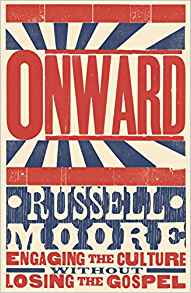
This book won a Christianity Today “Book of the Year” award for a reason. Christians ought to read and reflect upon it well. Here’s why…
Rarely does one encounter an author capable of recasting our worst nightmares as dreams come true. Christians in America have long feared losing the “culture wars” as the Bible Belt’s stronghold diminishes and secularism drowns out Christian voices. In Onward, Russell Moore argues that losing may be winning. Secularization is creating a fresh opportunity for the gospel to be seen as “strange” and as unacceptable to the world as it always has been.
The time is ripe for God’s church to go through a purification, casting aside perverted partnerships with world systems and distorted Western politics and values. The end result may not be more Christians in name but a stronger church that is drawn to Jesus himself and able to represent him afresh to America. Many Christians have been longing and striving for such purification, which explains the book’s popularity.
A Book with Great Counsel
Augmenting his pointed tone with a sincere pastoral sensitivity, Moore provides detailed counsel for how the church can re-engage issues including human sexuality, church-state relations, religious freedom, life issues, and the meaning of family. He not only asks us to concede our strangeness within the broader culture, but he implores God’s people to capitalize on it by embracing a richer kingdom perspective. If God is indeed preparing his people for a more profound mission in America, Moore’s plea to let the “good ole’ days” be bygones and reassess is a timely one.
Throughout Onward, Moore advises Christians to learn from the past, let go of the fear of man, live with conviction within the culture instead of quarrelsomeness, and genuinely love our neighbor as Christ intends.
A Book with Great Quotes
Here are a set of notable quotations from Onward that illustrate why this book, though not lengthy, is certainly a gem:
“Jesus came…to wreck our lives, so that he could join us to his. We cannot build Christian churches on a sub-Christian gospel. People who don’t want Christianity don’t want almost-Christianity” (5).
“We must learn to be strange enough to have a prophetic voice, but connected enough to prophesy to those who need to hear. We need to be those who know both how to warn and to welcome, to weep and to dream” (45).
“Worldliness means that we acquiesce to the priorities and the agenda of the systems now governing the world, in many cases because we don’t even question them” (53).
“A mission of redemption that leaves untroubled our place in unjust systems is far too safe, as is a mission of social activism that leaves untroubled our guilt before a holy God” (93).
“Any Christian witness that doesn’t start and finish with the gospel is unspeakably cruel and, in fact, devilish” (110).
“A Christianity that doesn’t prophetically speak for human dignity is a Christianity that has lost anything distinctive to say” (115).
“If we really believe the gospel is the power of God unto salvation, we don’t need bureaucrats to herd people into cowering before it” (145).
“Preachy propaganda doesn’t arrest the conscience. We, as ambassadors of Christ, are dealing with the aroma of life and the stench of death (2 Cor. 2: 15-16)” (199).

